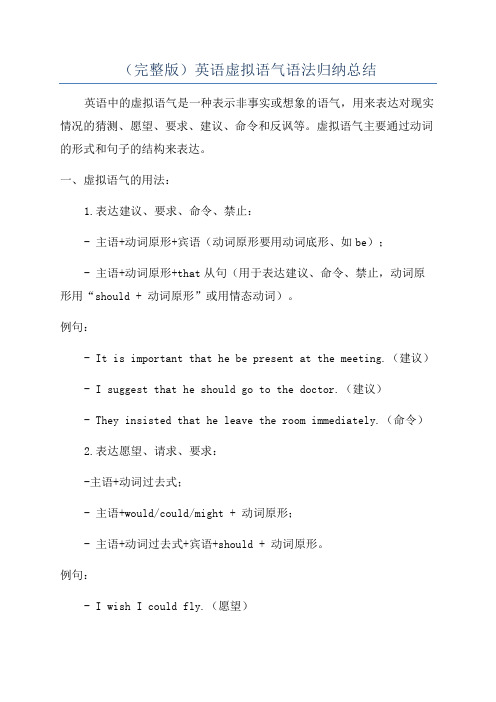(完整版)高中英语语法虚拟语气讲解
(完整版)英语虚拟语气语法归纳总结

(完整版)英语虚拟语气语法归纳总结英语中的虚拟语气是一种表示非事实或想象的语气,用来表达对现实情况的猜测、愿望、要求、建议、命令和反讽等。
虚拟语气主要通过动词的形式和句子的结构来表达。
一、虚拟语气的用法:1.表达建议、要求、命令、禁止:- 主语+动词原形+宾语(动词原形要用动词底形、如be);- 主语+动词原形+that从句(用于表达建议、命令、禁止,动词原形用“should + 动词原形”或用情态动词)。
例句:- It is important that he be present at the meeting.(建议)- I suggest that he should go to the doctor.(建议)- They insisted that he leave the room immediately.(命令)2.表达愿望、请求、要求:-主语+动词过去式;- 主语+would/could/might + 动词原形;- 主语+动词过去式+宾语+should + 动词原形。
例句:- I wish I could fly.(愿望)- I would appreciate it if you could help me.(请求)3.表示虚拟条件:- If条件从句中的谓语动词用过去完成时,主句用would/should/might/could + have + 过去分词;- If条件从句中的谓语动词用过去时,主句用would/should/could + 动词原形。
例句:- If I had known his phone number, I would have called him.(虚拟条件)- If you had listened to me, we could have finished the project earlier.(虚拟条件)4.表达建议、要求、祝愿:- If only内部称述 + 主语 + 过去式。
高中英语2025届高考语法复习虚拟语气知识讲解

高考英语语法复习虚拟语气知识讲解一、基础知识(一)什么是虚拟语气谓语动词的作用不仅可以表示动作的时间、状态、假设(情感),也是一种语气(mood)的表现形式,表明说话的目的和意图。
(语气包含陈述语气、祈使语气、虚拟语气、疑问语气)虚拟语气用于表示假设、愿望、建议、命令等非真实或虚拟的情况,即与真实相反。
上学的时候老师经常举的一个例子,"If I were you"因为我不可能是你,这是一种不可能存在的事实,所以这是个虚拟语句。
总而言之英语中的虚拟语气可以分为两大体系:一是表示与事实相反的,或者是假象的情形,通常由if引导,叫做虚拟条件句;另一个体系是在名词从句中使用虚拟语气,表示建议,命令或者要求等语气,类似于上述美剧常用的台词。
(二)虚拟语气的用法这一部分我们主要用虚拟语气在条件句中的用法作为讲解与现在事实相反:If I had a map, I would lend it to you.如果我有地图我就借给你。
(但我没有)与将来事实相反:If I were to do the job, I would do it in a different way. 要是我来做这工作,我会是另一种做法。
(言外之意不是我做这个工作,用虚拟表达是我做这份工作的可能性很低)与过去事实相反:If anything had happened, he would have let us know.如果发生了什么情况,他早就通知我们了。
(所以没事发生)它们的共性都是表示与事实相反或者实现可能性不大3.特殊情况①在极少情况下,从句的谓语动词用原形,主句的谓语动词可用陈述语气(比较官方,正式,大气的说法,口语很少使用)If that be the official view, it cannot be accepted.如果这是官方的看法,这是不能接受的。
②if可以省略,但是语序要改为倒装Were I Tom I would refuse.如果我是汤姆我会拒绝。
高中英语-虚拟语气精讲(超全整理篇)ppt课件

这些动词相对应的名词性从句也用should do
It is ord(e一r)e.d主/语c从o句mmanded /
should/would/could/mig ht + do
最新版整理ppt
7
1) If he has time,he will go shopping tonight.
与事实相反!
2) If I had time,I would visit you.
最新版整理ppt
8
与过去事实相反
虚拟条件句
主句
最新版整理ppt
♥பைடு நூலகம்27
1“坚持” insist
2“命令” order, command
3“建议” advise, suggest, propose, recommend
4“要求” ask, demand, require, request, desire
+ (that) sb (should) do ... 或是 (that) sb / sth (should) be done
3. were to do 最新版整理ppt
15
If虚拟句的省略和倒装
最新版整理ppt
16
如果条件状语中有were, had, should时, 可以省略 if倒装成:Were / Should / Had +主+其他
如If果I w我er是e 你yo,u, 我I w会ou再ld试try一it次ag。ain.
高中虚拟语气知识点全解

解析: demand(要求 ),order(命令 ), require(命令 ),recommend,insist(坚 决要求 ),suggest(建议),propose(提 出建议),advice(建议)后接宾语从句时, 宾语从句的谓语动词常用“should+动词原 形”should可以用于if only+句子=How I wish +that 从 句
• 如:If only I were a flying bird!=How I wish I were a flying bird!
我要是一只飞鸟该多好
(2)用于表示建议、愿望、命令等词后的宾语从句 中,常见的动词有:demand(要求 ),order(命 令 ),require(命令 ),recommend,insist(坚决 要求 ),suggest(建议),propose(提出建议), advice(建议)等。宾语从句中的虚拟语气结构为 “should +动词原形”should 可以省略。
cEo_Mr基德
虚拟语气是一种特殊的动词形式,一是用来表示说话人
所说的话不是一个事实,而是一种假设、猜测、怀疑等 (在条件从句中或让步状语从句中);一是表示说话人的愿 望、要求、命令、建议等 (在宾语从句、表语从句、同位 语从句)。
虚拟语气在非真实条件句中的运用
虚拟条件句
与现在事实相 反的假设
If+主语+动词的过去式 (动词be用were)
If you had followed my advice just now, you would be better now.
如果你刚刚听了我的建议的话,你现在就好 多了
2.If省略句
• 在条件句中可省略if,把were, had, should 提到句首,变为倒装句式。如:
(完整版)虚拟语气详解

虚拟语气详解虚拟语气表示说话人的主观愿望(往往与客观事实相反),或是表示假象和猜测。
虚拟语气无论从形式上还是时态上都比较复杂,需要归类记忆。
虚拟语气大体分为三类:(1) be型虚拟(2) were型虚拟(3) if 条件句及主句虚拟下面会详细说每种虚拟形式的特征和规律,考试时先判断属于哪种虚拟类型,剩下的皆是套路~(1)be型虚拟(基本是套路)形式:should + 动词原形,should可以省略用法:1)表示“命令、建议、要求”等意义词语之后的宾语从句用be型虚拟,常见的词如下: demand, desire, insist, order, ask, command, propose, recommend, suggest, prefer, require, request等最常见的形式是这类动词后面接着一个宾语从句,则宾语从句的谓语部分要用(should)+ 动词原形来虚拟例: We demand that the meeting(should)be postponed.The manager suggested that we (should) work together.注意:有时候你所见到不一定是上述动词引导的宾语从句,而是由上述词变体后所引导主语从句(it做形式主语,如:it is advised/ suggested/ requested/ ordered/ proposed that…)、表语从句或同位语从句例如:It is required that the students (should) learn a foreign language. (主语从句) The requirement is that all the equipment in the meeting room (should) be checked twice before. (表语从句)We didn’t stand for his proposal that the meeting (should)be postponed. (同位语从句)只要看到句中有上述动词或其变体,不管词性怎么变、句型怎么变,都用be型虚拟!特例:suggest和insist这两个比较特殊,当suggest作“暗示、表明、说明”讲,insist作“坚持说”讲,后面一般跟的是客观事实,不需要虚拟~这是一个比较重要的考点,体会下面两组句子:We all suggest that a lab (should) be built. 我们都建议建一个实验室。
(完整版)高中虚拟语气用法详解

(完整版)⾼中虚拟语⽓⽤法详解⼀、什么是虚拟语⽓虚拟语⽓是⼀种动词形式,表⽰说话⼈的⼀种愿望,假设,怀疑,猜测,建议等含义,虚拟语⽓所表⽰的含义不是客观存在的事实。
If I were you, I'd take them away. 如果我是你的话,我就会带⾛他们。
(不可能是你,所以这是不存在的事实,所以⽤虚拟语⽓)If I had met Tom, I could have told him. 如果我碰见了Tom ,我就告诉他了。
If I had time, I could come to help you. 如果我有时间,我会来帮助你的。
He suggested that our class should be divided into five groups. 他建议说我们的班应该分成五个⼩组。
He speaks to us as if he had been there. 他给我们讲的好像他去过那⼉。
⼆、虚拟语⽓的⽤法虚拟语⽓在⼀般⽤于简单句,宾语从句,主语从句,表语从句,壮语从句以及同位于从句。
(下⾯我们分别看⼀下)1) 虚拟语⽓⽤在简单句中,表⽰祝愿,命令,它的谓语动词就是原形。
May you be happy. 祝你幸福。
May you have a good time. 祝愿你玩的痛快。
May the friendship between us last long. 祝愿我们的友情天长地久。
Have a good journey! 祝愿你旅途愉快!You go out !你出去!2) 虚拟语⽓⽤在宾语从句中。
在suggest, advise, propose, insist, demand, desire, request, require, decide, order, command 等动词后的宾语从句中,要⽤虚拟语⽓,表⽰建议、要求、决定或命令等,其谓语动词形式为should+ 动词原形,其中should 可以省略,主句中的时态不限。
高中英语之虚拟语气详细讲解
虚拟语气(1)——倒推时态类定义:虚拟语气是一种动词形式,有两种意思 1.表示说话人所说的不是事实,而是一种假设、猜测、怀疑等(非真实条件状从和让步状从)2.表示说话人的愿望、要求、命令、建议(名词性从句:主宾表同)使用情景 1.用来表达一个假设或纯粹的意愿(与事实相反或不太可能实现)(如果我是宇航员,我要在月球上跳舞)2.用来缓和语气,使句子更委婉、礼貌、得体(如果你能接受我的邀请,我将不胜感激)3.表示烦恼、不耐烦等情绪(你要是能考上大学,全家都烧高香了)4.表示适度的责备或批评(如果你那时更耐心点,现在我们都成功了)5.表示美好的祝愿或祝福(祝你成功)1.虚拟条件句一般虚拟条件句混合虚拟语气(错综时间条件句)定义:条件状语从句表示的行为和主句表示的行为发生的时间不一致例子:If you had followed my advice, you would be better now.如果那时你听了我的建议,现在已经好了If it hadn’t been for you, I would have to make another trip there tomorrow.如果不是你的话,我明天还要再走一趟。
If you had studied hard before,you would be a college student now.如果你以前努力学习的话,你现在就是大学生了。
省略+倒装当虚拟条件句的谓语动词中含有were,should,had时,if可以省略,并将were,should,had提前于句首,变为倒装句。
如果虚拟条件句是否定句,not 保留在原处If he should agree to go there, we should send him there.= Should he agree to go there,we should send him there.If she were there,she would agree with us.= Were she were, she would agree with us.If he had learnt about computers,we would have hired him.= Had he learnt about computers,we would have hired him.含蓄虚拟条件句定义:有时为了表达的需要,在虚拟语气中并不总是出现if引导的条件状语从句,而是通过其他手段来代替条件从句分类:1) but for....=(If it+be not for) ;without;Without your help ,we couldn’t have finished the work ahead of time.= But for your help,we couldn’t have finished the work ahead of time.= If it hadn’t been for your help,we couldn’t have finished the work ahead of time.没有你的帮助,我们不可能完成任务。
高中虚拟语气用法解析
高中虚拟语气用法解析(完整版)一.虚拟语气在非真实条件句中的应用非真实条件句:if引导的条件状语从句,但是实现该条件的可能性极小或不可能实现1.表示与过去事实相反Eg.If my car had been more reliable,I would have driven to my office.2.表示与现在事实相反Eg.In fact,it is certain that we would not be able to understand it if we heard it today.3.表示与将来事实相反Eg.If you succeed,everything would be all right.Grace doesn't want to move to New York because she thinks if she were to live there,she wouldn't be able to see her parents.4.注意事项(1)W as不可以替代were,虚拟语气中,从句中be动词只有were(2)错综时间条件句:条件句的行为和主句行为发生的时间不一致,动词的形式按照主句和从句各自的时间调整。
Eg.If he had listened to me, he would not be in such trouble now. If it had not been raining too much, the crops would be growing much better.(3)虚拟条件句中的谓语动词含有were/ should /had 时,if可省略,而将were/ should /had 置于主语前面Eg.What would have happened had Bob walked farther as far as the river bank?Should he agree to go there, we should send him there. Were it Sunday tomorrow, we should go to the great wall.两个固定搭配:①Were it not for 要不是...就②Had it not been for 要不是...就If it were not for (Were it not for)the bad weather now, we would go to the park to fly kites.If it had not been for(Had it not been for) the bad weather yesterday, we would have gone to the park to fly kites. (4)含蓄虚拟条件句:有时假设的情况不是以if条件句来表示。
高中英语虚拟语气讲解(很完整的总结)
Subjunctive Mood虚拟语气(1)If I had got there earlier, I would have met Mr. Li.If he hadn’t been warned,he would have taken that food.(2)If he were free, he would help us. If I had money, I would buy the car.If it were not for the expense, I would go abroad now.(3) If he should come/were to come/came here, we would hold the party.If it were to rain tomorrow, the meeting would be put off.1.倒装/省略当虚拟条件句中的谓语动词含有were, should, had时,if可省略,而将were, should, had 等词置于句首。
请改写以上六个例句中符合倒装/省略条件的句子!2.错综时间虚拟条件句。
主从句的动作若不是同时发生时,须区别对待。
①从句的动作与过去事实相反,而主句的动作与现在/将来的事实不符。
If they had informed us, we would not come here now.If you had listened to me, you wouldn’t be in such trouble now.If you hadn’t watched television so late, you wouldn’t be so sleepy now.If I had studied hard at school, I would be a student in the key university now and find a good job after four years.②从句的动作与过去发生的情况相反,而主句的动作与现在正在发生的情况相反。
2025届高考英语虚拟语气知识点总结+课件
Homework
1. 完成高考汇编关于虚拟语气的练习题; 2. 用虚拟语气完成小诗。小诗的首句已给出。
If I were a bird, I would fly into the sky. ......
Thanks
为什么不用If I am a boy? 为什么不用If I was a boy?
虚拟语气是由句中的谓语动词的特殊形式表示出来的。
动词语气
1、虚拟语气:虚拟语气表示说话人的主观愿望、猜疑、建议或与事实不符 的假设等,而不表示客观存在的事实。 2、虚拟语气是由句中的谓语动词的特殊形式表示出来的。
你会辨认虚拟语气了吗?
对现在的虚拟条件从句
If there were no subjunctive(虚拟语气), English would be much easier.
从句
主句
If + 主语 + 过去式(were),主语 + should/would/could/might + 动词原形
来练一练
1. If there ____w__e_r_e____ (be) no air or water,there ____w_o_u__ld__b_e_____no living things on the earth.
如果我是个男孩 我想我能够明白 爱一个女孩是什么样的滋味 我发誓我会是一个好男人 我会倾听她, 因为我了解
When you loose the one you wanted 失去了你爱的人那有多痛苦
Cause he’s taken you for granted
因为他把你视作理所当然
And everything you had got destroyed! 你的一切都被毁
- 1、下载文档前请自行甄别文档内容的完整性,平台不提供额外的编辑、内容补充、找答案等附加服务。
- 2、"仅部分预览"的文档,不可在线预览部分如存在完整性等问题,可反馈申请退款(可完整预览的文档不适用该条件!)。
- 3、如文档侵犯您的权益,请联系客服反馈,我们会尽快为您处理(人工客服工作时间:9:00-18:30)。
高中英语语法讲解--虚拟语气1。
语气的定义和种类(1)语气的定义语气是动词的一种形式,它表示说话人对某一行为或事情的看法和态度。
(2)语气的种类A. 陈述语气表示动作或状态是现实的、确定的或符合事实的,用于陈述句、疑问句和某些感叹句。
We are not ready.Did it rain all day yesterday?What a fine day today!B. 祈使语气表使说话人的建议、请求、邀请、命令等。
Be careful.Don’t forget to clo se the window.Open the door, please。
C。
虚拟语气表使动作或状态不是客观存在的事实,而是说话人的主观愿望、假设或推测等.2。
虚拟语气一. 虚拟语气在条件句中的应用学习虚拟语气在条件句中的用法之前我们必须清楚条件句的种类:条件句有真实条件句与非真实条件句(或称虚拟条件句)两种。
真实条件句所表的假设是可能发生或实现的,句中的条件从句与结果主句都用陈述语气。
如:If it doesn’t rain tomorrow, I will go for a picnic。
假若明天不下雨,我就去野餐.Oil floats if you pour it on water. 你如把油倒在水里,油就浮起来。
虚拟条件句所表的假设则是不可能或不大可能发生或实现的,句中的条件从句与结果主句皆须用虚拟语), 主句的谓语用should (would, might, could)+动词原形。
如:If it were not raining, we should go for a picnic.如果现在不下雨的话,我们就出去野餐了。
(事实是:天在下雨,我们不能出去野餐.表示愿望。
)If he came here, he might be able to help you. 如果他来这,他就能够帮助你了。
(事实是:他没来这,他不可能帮助你。
表示对他的良好印象。
)2。
与过去事实相反的虚拟条件句,条件从句的谓语用had+过去分词,主句的谓语用should ( would,might, could)+ have +过去分词。
如:She would have gone to the party if she had been invited.要是当初她被邀请的话,她就会去参加这次聚会了.(事实是:当时没有人邀请她,因此,她没有来参加聚会。
表示后悔。
)If she hadn't called me, I would have overslept this morning。
今天早上,她要是不叫我的话,我就会睡过头了。
(事实是:她今天早上叫我了,我没有睡过头。
表示感激。
)3。
与将来事实可能相反的虚拟条件句,条件从句的谓语用动词的过去式(be的过去式用were); should +动词原形;were to+动词原形,主句用should (would, might, could)+动词原形。
如: If I were to be twenty years old next year, I would take the course of French.明年我要是二十岁,我就会学法语。
(事实是:我现在已经老了,明年我学不了法语了。
)If it should fail, I would try again。
要是失败了,我会再试一次。
(事实是:有可能失败,可我会再试。
表示未知。
)虚拟过去式有时并不表示“不大可能实现的假设",而是表示一种希望或不希望发生的动作.如: If we caught the early train,we’d get there by lunch time。
假如我们赶上早班火车,到午饭时间我们就会到达那里了。
(表希望)If we missed the train, we should have to wait an hour at the station.假如我们赶不上这班火车,我们就得在车站等一小时.(表不希望)4。
混合型的条件句当条件从句与主句所表的时间不一致时,虚拟语气的形式应作相应的调整.主句和从句的谓语动词并不相互呼应,这种条件句叫混合条件句。
较多见的混合型条件句是从句用过去完成时(指过去行为),而主句用一般时(指目前状态)。
He would pass the test if he had taken my advice.如果他听了我的劝告,他现在会通过考试.If I had spoken to him yesterday, I should know what to do now。
假如昨天我对他说了,现在我就知道该怎么办了。
You would be much better now if you had taken my advice.假如你接受了我的意见,你现在就会好得多.如条件从句用if I were。
.,主句则可用表任何时间的虚拟形式。
如:If I were not busy, I would have come。
假如我不忙,我就会去了。
(were表过去)If I were you, I would go.假如我是你,我会去的。
(were表现在)二。
连词if的省略(倒装)如果虚拟条件句的谓语部分有were,had和should时,可省略if,把were,had和should放到从句主语前面去,多见于书面语。
Had you not helped me, I should have failed。
要是没有你的帮助,我就失败了。
Were you in my position, you would do the same。
假如你处在我的地位,你也会这样干的。
Should they attack us, we'll wipe them out completely。
假如他们进攻我们,我们就把他们彻底消灭干净。
例:1. _________ he would have succeeded in the examination。
A. Had he worked hardB。
If he worked hardC。
If he works hardD。
If he has worked hard2. _______ it rain tomorrow, we would stay at home。
A. Should B。
Be C。
Were D。
Will3. _______, he would teach us how to solve the problem.A。
Were he here B。
Was he hereC。
If he is D. Is he here4. _________, we should be glad。
A。
Were they to arrive tomorrowB。
They were to arrive tomorrowC。
They would arrive tomorrowD. They arrive tomorrow5. _______ the clouds, you would find the airplane in the sky easily。
A .Were it not for B. If it had not been forC。
If it were not D. Had it not been for答案:1—5 AAAAA三。
含蓄条件句虚拟条件句中的条件从句有时不表出来,只暗含在上下文中,这种句子叫做含蓄条件句。
含蓄条件句大体有三种情况。
1) 条件暗含在短语中。
如:But for your help we couldn’t have succeeded in the experiment.如果没有你的帮助,我们的实验是不会成功的。
(暗含在分词短词but for your help)What would I have done without you? 如没有你,我会怎么办呢?(条件暗含在介词短语without you 中)It would be easier to do it this way. 这样做会比较容易。
(条件暗含在不定式短语 to do it this way中)This same thing, happening in wartime, amount to disaster。
同样的事,如发生在战时,就会酿成大祸。
(条件暗含在分词短语happening in wartime 中)He must have the strength of a hippopotamus, or he never could have vanquished that great beast。
他一定是力大如河马,否则他绝不会击败那只庞大的野兽。
(暗含条件是连词or)Alone, he would have been terrified. 如是单独一人,他是会感到害怕的.(暗含条件是alone)2) 条件暗含在上下文中.如:You might stay here forever. 你可以永远待在这儿.(可能暗含if you wanted to)We would have succeeded。
我们本来是会成功的。
(可能暗含if we had kept trying)Your reputation would be ruined。
你的名誉会败坏的。
(可能暗含 if you should accept it)3) 在不少情况下,虚拟式已变成习惯说法,很难找出其暗含的条件。
如: You wouldn’t know。
你不会知道。
I would like to come. 我愿意来。
四。
不用if引导的条件从句虚拟条件句中的条件从句除用if引外,还可用when, unless, lest, suppose, as if, for fear, in case, on condition 等词语来引导.如:The peasants prepared to feed the city when it should be freed.农民已准备在这座城市解放后供给粮食。
Lest you should not have heard all, I shall begin at the beginning.我怕你没有听全,所以我再从头开始讲一遍.Unless I were well, I wouldn’t be at school. 除非我好了,否则我不会上学。
Suppose you were given a chance to study in America , would you accept?假如给你一个到美国学习的机会,你会接受吗?(suppose 或 supposing =what if)Supposing it were so?(=Supposing it were so,what would happen?)要是这样的话,会怎么样呢?He can use the bicycle on condition that he should return it tomorrow.如果明天能还回来,他就可以借用这辆自行车。
